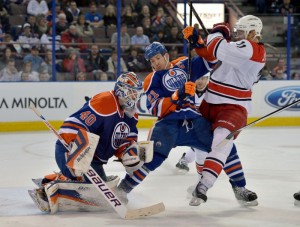When Ron Francis and Bill Peters took over the Carolina Hurricanes in 2014, the team was far from a playoff contender. The Canes now have a revamped defense, even with the recent loss of Ron Hainsey, and an exciting lineup of young offensive talent that includes Sebastian Aho, Viktor Rask and Teuvo Teravainen. However, they still seem to fall just short of the standards for a playoff team.
While Carolina has the personnel in place to jockey for a postseason berth, their lack of physical play is holding them back. It leaves them exposed in front of their own net and tired at the end of games, and it allows opponents to deny the Hurricanes’ skill players the space they need to create.
Protect Your House
One area in which the Hurricanes are noticeably soft is in front of their own net. You often see teams get into post-whistle shoving matches around their cage to protect their goaltender or establish their defensive presence, but you do not see much of this from Carolina. That lack of physicality around the net translates into the Canes’ play, and teams take advantage of the extra space given to them in a prime scoring area.
Scott Wilson’s goal at the beginning of Tuesday night’s contest against Pittsburgh is a perfect example of the Hurricanes being too soft in front of their own net. First, Carolina defenseman Matt Tennyson sets up on the far side of the net, leaving Wilson plenty of room to step in and ready for a shot or, in this case, a deflection. On top of his poor positioning, Tennyson’s last-second push to force Wilson out of the slot is not near enough to remove him from scoring position, and the result is a Pittsburgh goal.
Late Game Fatigue
The Hurricanes’ deficiency in the physicality department also gives them issues towards the ends of games. For fans, hitting is all about the spectacle and excitement of physical contact, but for players, it is about wearing down the opposition. In recent games, against Washington and Toronto, Carolina faltered in the final 20 minutes, costing them opportunities for two big wins.

Both of these teams physically outmatched the Hurricanes, forcing Carolina to expend more energy through the first and second periods. The Capitals outhit the Canes 22-10, and while Toronto and Carolina were fairly even in the hit column, goals like Austin Matthews’ made it clear that the Hurricane defense could not overpower the Maple Leafs’ sizeable forwards. As a result, the Hurricanes were depleted in the third period, allowing their opponents to control play.
In both instances, the Canes trailed 2-0 after the first two periods. However, they played both opponents evenly through 40 minutes and gave themselves a chance to come back and win both games. Unfortunately, the Leafs and Caps outshot Carolina 23-16 in the third, and the Canes gave up three tallies to Washington and two to Toronto.
Creating Space
Outside of the physical aspects of hockey that can be measured by statistics or observed on film, there is a mental impact that physicality has on players and teams. The San Jose Sharks are a prime example of a team whose physical play has helped pave the road to success. The Sharks use blue-collar players like Brenden Dillon and Justin Braun to intimidate and create space for Logan Cotoure and Patrick Marleau to dazzle you with their goal-scoring ability.

While the Hurricanes aren’t the San Jose Sharks, they still need to find a way to make room for the top players. Just last Sunday, the Maple Leafs laid on a relentless forecheck that suffocated Carolina’s breakout. Toronto felt comfortable taking the risk because they were confident the Hurricanes couldn’t handle their size and physicality. While the Canes have acquired a healthy amount of speed and skill, they’re still missing a couple of big bodies that can throw their weight around and give players like Jeff Skinner and Sebastian Aho more space to work with the puck.
While the Canes have acquired a healthy amount of speed and skill, they’re still missing a couple of big bodies that can throw their weight around and give players like Jeff Skinner and Sebastian Aho more space to work with the puck.
The NHL has certainly scaled back the need for tough guys and big hitters, but physical play is still a very important aspect of the game. The Hurricanes’ inability to consistently match their opponent’s physicality allows teams to take advantage of them in front of their own net and wear them down at the ends of games. Most importantly, it allows the Canes’ opponents to take away space and challenge the puck without fear of being hit. Francis has done an excellent job creating a skilled roster in Carolina, now it is time to add a hard-nosed supporting cast to defend it.
Francis has done an excellent job creating a skilled roster in Carolina. Now it is time to add a hard-nosed supporting cast to defend it.